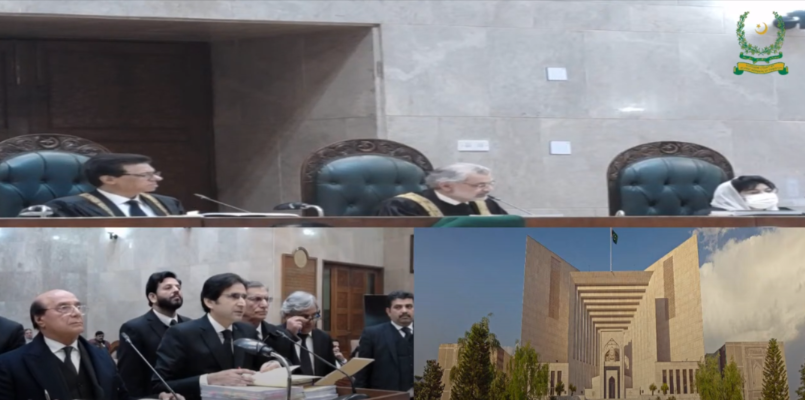On Monday, PTI lawyer Latif Khosa was told by Chief Justice of Pakistan (CJP) Qazi Faez Isa not to accuse a constitutional authority unless evidence is provided. This advice was given in Islamabad.

The Supreme Court’s (SC) December 22 directions were meant to ensure a “level playing field” for the PTI in the forthcoming elections; the PTI is now suing the Election Commission of Pakistan (ECP) for contempt for allegedly disobeying these directives, which the CJP made a comment on when hearing their appeal.
Along with Justices Muhammad Ali Mazhar and Musarrat Hilali, Chief Justice Isa emphasized the need to back up claims with evidence. On the website of the Supreme Court, the proceedings were being aired live.
This hearing follows the ECP’s response to the Supreme Court the day before, in which it contradicts the PTI’s claims of an unfair playing field by declaring that 76% of the party’s nomination papers for the forthcoming elections had been accepted.
While 1,398 out of 1,777 nomination papers were accepted for the provincial assemblies, the ECP said that 598 out of 843 nomination papers for the National Assembly had been accepted, citing data from returning officers.
The CJP questioned Khosa whether he intended the Supreme Court to accept all of the nomination papers submitted by candidates from his party, taking issue with the PTI counsel’s “politicisation” of the issue.
“Implications of the [ECP’s] report?” Justice Isa polled the solicitors. The chief justice requested that Khosa document any concerns he had with the chief secretary of the ECP in Punjab’s written response that had been sent to the Supreme Court. “Refrain from making verbal accusations,” Justice Isa said.
“Get right to the point. Clearly state your expectations of the SC. Feel free to inform us of any state institution in which you lack confidence. Based on that, we shall issue an appropriate order,” the CJP noted.
“Calm down and stop nitpicking,” Justice Isa admonished. “Everyone in the nation is aware of the discrimination we are facing,” Khosa responded. The CJP then made the statement that the Supreme Court was broadcasting the proceedings live, thus informing the world about it.
The PTI lawyer expressed disappointment that the party is trying to level the playing field and went on to say that the party’s electoral operations have been hampered by the imposition of Section 144, while those of other parties have been unaffected.
Without limiting itself to any one political party, Justice Isa clarified that Section 144 applies to all of them and inquired as to the meaning of “other candidates” from the counsel. He went on to inquire as to if the lawyer was suggesting that the PML-N was involved in a plot against the PPP and the JUI-F as well.
Justice Isa agreed to hear the PTI’s appeal against the removal of its electoral symbol on January 10, as requested by Hamid Khan, another PTI representative, and set the issue for hearing on that date.
Not only are the petitions from the PTI being considered, but they also outnumber all others. But you also don’t want to waste time going to the hearing and want to get things resolved quickly, the chief judge added.
It is the duty of the electoral authority to address allegations of stolen nomination papers, as the chief justice made clear; the courts do not have jurisdiction over election administration.
In addition, he questioned the rationale of the supreme court’s jurisdiction over ECP cases. Nevertheless, he emphasised that the Supreme Court will fulfil its responsibility in the event that a petition is filed with them.
The Supreme Court has ordered the PTI’s legal team to respond in writing to the reports given by the ECP and its Punjab chief secretary; the court has adjourned the case until January 15.
Before this meeting
During the most recent case hearing on January 3, the PTI legal team encountered difficulties in front of the Supreme Court in elucidating concrete instances of the lack of a fair playing field in Punjab about the forthcoming general elections set for February 8.
Nevertheless, the three-judge panel, presided over by CJP Isa, was eventually persuaded to request an update from the chief secretary and top police officer of Punjab regarding the measures they had implemented in response to a letter from the Punjab election commissioner.
A letter was sent by the provincial elections supervisor requesting that the authorities make sure that all candidates have a pleasant experience when they submit their nomination papers to the returning officers (ROs).
The PTI had petitioned the Election Commission of Pakistan (ECP) and other executive officials for contempt for failing to comply with the court’s ruling from December 22, and the bench that included Justice Muhammad Ali Mazhar and Justice Musarrat Hilali accepted the case.
The PTI’s Latif Khosa and Shoaib Shaheen presented their cases to the bench, but the judges were unconvinced. On more than one occasion, the chief justice barred Khosa from using the bench to make political remarks.
The PTI attorneys concluded by citing the Punjab election commissioner’s two-page letter.
If the attorneys hadn’t included this letter with the petition, the witnesses to the proceedings would have agreed, the SC wouldn’t have issued notices to the provincial authorities.
Professional counsels should be retained by the PTI in such cases, according to certain legal experts.










































